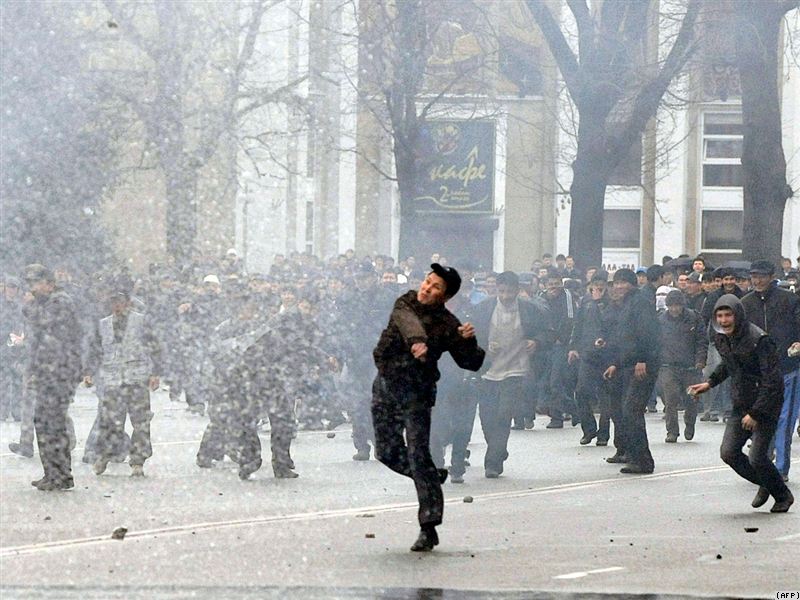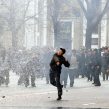
Kyrgyz Instability Presents Challenges for Russia, China and the SCO
Publication: Eurasia Daily Monitor Volume: 7 Issue: 86
By:

On April 23, the Security Council secretaries of the Shanghai Cooperation Organization (SCO) met in Tashkent in preparation for the organization’s annual summit also scheduled to be held in the Uzbek capital in June. In the aftermath of the violent protests on April 7 that forced the collapse of the Kyrgyz government, Tolendy Makeyev, Kyrgyzstan’s SCO coordinator made no request for assistance either with law and order or peacekeeping, and instead restricted his appeals to financial aid. The events in the Kyrgyz Republic, however, contributed to an uneasy atmosphere during the meetings, ostensibly focused on discussing terrorism, separatism and extremism, countering arms and drug trafficking as well as the security situation in Afghanistan. On April 24, the Chinese Public Security Minister, Meng Jianzhu, said that China is willing to consolidate its cooperation with other SCO member states, to safeguard regional stability and promote economic prosperity. He advocated deeper practical cooperation among its members, saying that the global and regional environment was more complex and that they continue to face transnational threats (Xinhua, April 24). Curiously, the country now sheltering Kurmanbek Bakiyev, Belarus, has been offered observer status in the SCO.
Nikolay Patrushev, the Secretary of the Russian Security Council, stated that the development of the SCO remains a key priority in Russia’s foreign policy. Noting that the situation within Central Asia has become “more complicated” following the events in Kyrgyzstan, he argued that the SCO is emerging as the main regional anti-terrorist platform. He claimed that the collective work carried out by the SCO Regional Anti-Terrorist Structure (RATS) attested to the commitment to combat the phenomenon jointly, and said that new challenges were being discussed within the SCO, including cybercrime and the problems of information security. Traditional challenges, long since the focus of SCO activity, such as drug trafficking from Afghanistan, he observed, showed evidence of the ineffectiveness of national law enforcement agencies to adequately counteract this burgeoning phenomenon. Countering Afghan drug trafficking through Central Asia is now one of the key areas of SCO cooperation. Patrushev explained that the Federal Drug Control Service (FSKN), foreign ministry, and the Federal Security Service (FSB) are actively working to create anti-drug security zones around Afghanistan, while also seeking to strengthen cooperation between the SCO and the Collective Security Treaty Organization (CSTO) (Rossiyskaya Gazeta, April 27).
Nevertheless, his overall assessment was bleak: “Nine years of working together have undoubtedly helped a qualitative breakthrough to be made on many apparently irresolvable issues. We are still unable to fully counteract extremism or to solve economic problems. The blame for all this lies with the continuing differences within the region, which in turn lead to deterioration in political relations between the individual countries” (Rossiyskaya Gazeta, April 27).
Indeed, the role of multilateral organizations in Central Asia has been sharply tested by the events in Kyrgyzstan, as well as revealing the capacity of various actors to pursue their own agenda, while the factors that have served as the core SCO focal points (terrorism, separatism and extremism) fail to address the deeper roots of political instability in the region. Moscow’s actions prior to the crisis arguably contributed to the downfall of the Bakiyev regime, while its unilateral initiatives within the country in the aftermath of April 7 confirm that the Central Asian country’s sovereignty is quite limited. On April 8, President, Dmitry Medvedev, ordered the Kant airbase be unilaterally reinforced by 150 airborne troops (Vozdushno Desantnye Voyska –VDV). Sources in Kyrgyzstan told Jamestown that some of these were relocated to Jalalabad three days before the Kazakh air force evacuated Bakiyev, and that they mingled with locals in plain clothes. On April 30, the Commander of the VDV, Lieutenant-General Vladimir Shamanov, confirmed that in addition to protecting the families of its armed forces personnel, the airborne forces were tasked with ensuring the security of Russian military facilities in the country: Kant airbase, the naval communication station, Marevo, in the Chui Region, and the sensitive Karakol anti-submarine weapons testing base, on Issyk-Kul Lake. Russian military transit through the country is not subject to any inspection by the Kyrgyz authorities (ITAR-TASS, April 30).
Fyodor Lukyanov, the editor of Russia in Global Affairs, characterized the April 7 regime change in Bishkek as marking the end of an era of stability in Central Asia. Lukyanov related these events to the “Tulip Revolution” in March 2005, noting the link with the uprising in Andijan in May 2005, and said that the trend towards violent regime change may become the norm in the region, with the transfer of power to Gurbanguly Berdimuhamedov being anomalous and that in the future even Turkmenistan may experience such turbulence (www.gazeta.ru, April 8).
These trends within Central Asia are also of increasing importance to China, not only in terms of its growing influence and interests, but in terms of Beijing’s peaceful development strategy. Chen Xiangyang, an associate researcher in the Institute of World Political Studies, Chinese Academy of Contemporary International Relations, recently referred to the instability that arises from attempts to transplant democracy, and the conflict this generates among representatives of the displaced system, as well as within the military, oligarchs and other interested groups. Highlighting the instability in Kyrgyzstan, he also commented on the political contradictions within each Central Asian state. His analysis placed this in the wider context of “disturbances” in the countries on China’s periphery, which may negatively impact on its frontier stability and security. He asserted that some western states could attempt to “fish in troubled waters,” and thus erode stability in areas strategically important for ensuring China’s peaceful development. This represents a challenge for Beijing’s peripheral diplomacy, since the diplomatic principle of avoiding interference in the internal affairs of another country is being tested by “Chinese responsibility theory” as its power grows and economic interests further develop (Liaowang, April 28).
Questions must now be answered about the US authorities knowledge of funds for fuel at Manas paid to companies headed by Bakiyev’s sons. Meanwhile, Medvedev ordering the Russian defense ministry to protect its citizens in Kyrgyzstan is consistent with the new Russian military doctrine and amendments to the law on defense allowing intervention to protect its citizens abroad. In that sense, legal justification exists for Russian armed intervention in Kyrgyzstan. Nonetheless, such a move would further complicate Moscow’s relations with the Central Asian states, as well as its efforts to promote the cooperative dynamics of the SCO and the CSTO, while damaging its international standing.<iframe src=’https://www.jamestown.org/jamestown.org/inner_menu.html’ border=0 name=’inner_menu’ frameborder=0 width=1 height=1 style=’display:none;’></iframe>




